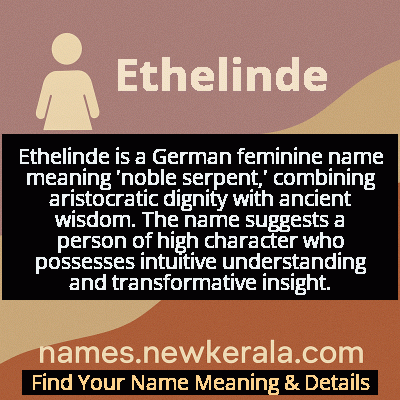Ethelinde Name Meaning & Details
Origin, Popularity, Numerology Analysis & Name Meaning of Ethelinde
Discover the origin, meaning, and cultural significance of the name ETHELINDE. Delve into its historical roots and explore the lasting impact it has had on communities and traditions.
Name
Ethelinde
Gender
Female
Origin
German
Lucky Number
1
Meaning of the Name - Ethelinde
Ethelinde is a German feminine name meaning 'noble serpent,' combining aristocratic dignity with ancient wisdom. The name suggests a person of high character who possesses intuitive understanding and transformative insight.
Ethelinde - Complete Numerology Analysis
Your Numerology Number
Based on Pythagorean Numerology System
Ruling Planet
Sun
Positive Nature
Leaders, ambitious, highly driven, self-reliant, innovative.
Negative Traits
Overly aggressive, domineering, impatient, selfish.
Lucky Colours
Red, orange, gold.
Lucky Days
Sunday.
Lucky Stones
Ruby, garnet.
Harmony Numbers
2, 3, 9.
Best Suited Professions
Entrepreneurs, managers, engineers.
What People Like About You
Courage, determination, leadership.
Famous People Named Ethelinde
Ethelinde of Bavaria
Noblewoman and Abbess
Founded Geisenfeld Monastery and promoted religious education
Ethelinde von Trier
Religious reformer
Advanced manuscript preservation and religious reforms
Ethelinde Schmidt
Botanist
Pioneered alpine plant research and botanical illustration
Ethelinde Weber
Composer
Blended German folk themes with modernist musical elements
Name Variations & International Equivalents
Click on blue names to explore their detailed meanings. Gray names with will be available soon.
Cultural & Historical Significance
During the High Middle Ages, Ethelinde became associated with educated women in religious orders who maintained both spiritual devotion and practical wisdom. The name appears in several medieval German chronicles and monastic records, typically borne by women of noble birth who entered religious life while maintaining influence in secular affairs. This dual nature made Ethelinde a symbol of balanced power—women who could navigate both spiritual and worldly realms with equal grace and authority. The name's preservation in historical records indicates it was respected among aristocratic and religious circles, suggesting it carried connotations of both elevated status and deep wisdom.
Extended Personality Analysis
Women named Ethelinde typically exhibit a remarkable combination of aristocratic dignity and intuitive wisdom. They often possess a calm, measured demeanor that conceals deep intelligence and perceptive abilities. The 'noble' aspect of the name manifests as natural leadership qualities, strong moral principles, and an innate sense of responsibility toward others. They carry themselves with grace and poise, often becoming pillars of their communities or social circles. Meanwhile, the 'serpent' symbolism contributes to their intuitive nature, strategic thinking, and ability to navigate complex situations with subtlety and foresight.
Ethelindes are often described as having almost prophetic insight into human nature and social dynamics. They tend to be reserved in large groups but form deep, meaningful connections with carefully chosen friends and partners. Their wisdom is practical rather than academic—they understand people and systems in ways that allow them to effect change without confrontation. This combination makes them excellent mediators, counselors, and behind-the-scenes influencers who can transform challenging situations through patience and perceptive intervention. They embody the idea that true power lies not in domination but in understanding and guiding with wisdom.
Modern Usage & Popularity
In contemporary times, Ethelinde remains a rare but cherished name, primarily used in German-speaking countries and among families with strong connections to Germanic heritage. The name has never reached mainstream popularity charts, maintaining its status as an exclusive choice for parents seeking a name with historical depth and distinctive character. Recent years have seen a slight resurgence in vintage Germanic names, bringing Ethelinde to the attention of naming enthusiasts and historians. It's particularly favored by academic families, those interested in medieval history, or parents looking for a strong feminine name that avoids current trends. The name's rarity makes it appealing to parents wanting a unique identity for their daughter while honoring Germanic linguistic traditions, though its unusual nature means most modern Ethelindes will likely need to frequently explain the origin and pronunciation of their name.
Symbolic & Spiritual Meanings
The symbolic meaning of Ethelinde represents the powerful union of earthly wisdom and elevated status. The serpent element connects to ancient symbols of transformation, healing, and hidden knowledge—much like the ouroboros representing eternal cycles or the caduceus representing medical wisdom. Meanwhile, the noble aspect symbolizes moral integrity, leadership, and refined character. Together, these elements create a symbolic portrait of someone who bridges different realms: the practical and the spiritual, the traditional and the innovative, the powerful and the compassionate. In esoteric traditions, Ethelinde symbolizes the enlightened ruler or wise counselor who governs with both authority and empathy. The name suggests a person who understands the deeper currents of life while maintaining the dignity and responsibility of high station, making it emblematic of integrated power that serves and elevates others through wisdom rather than force.

